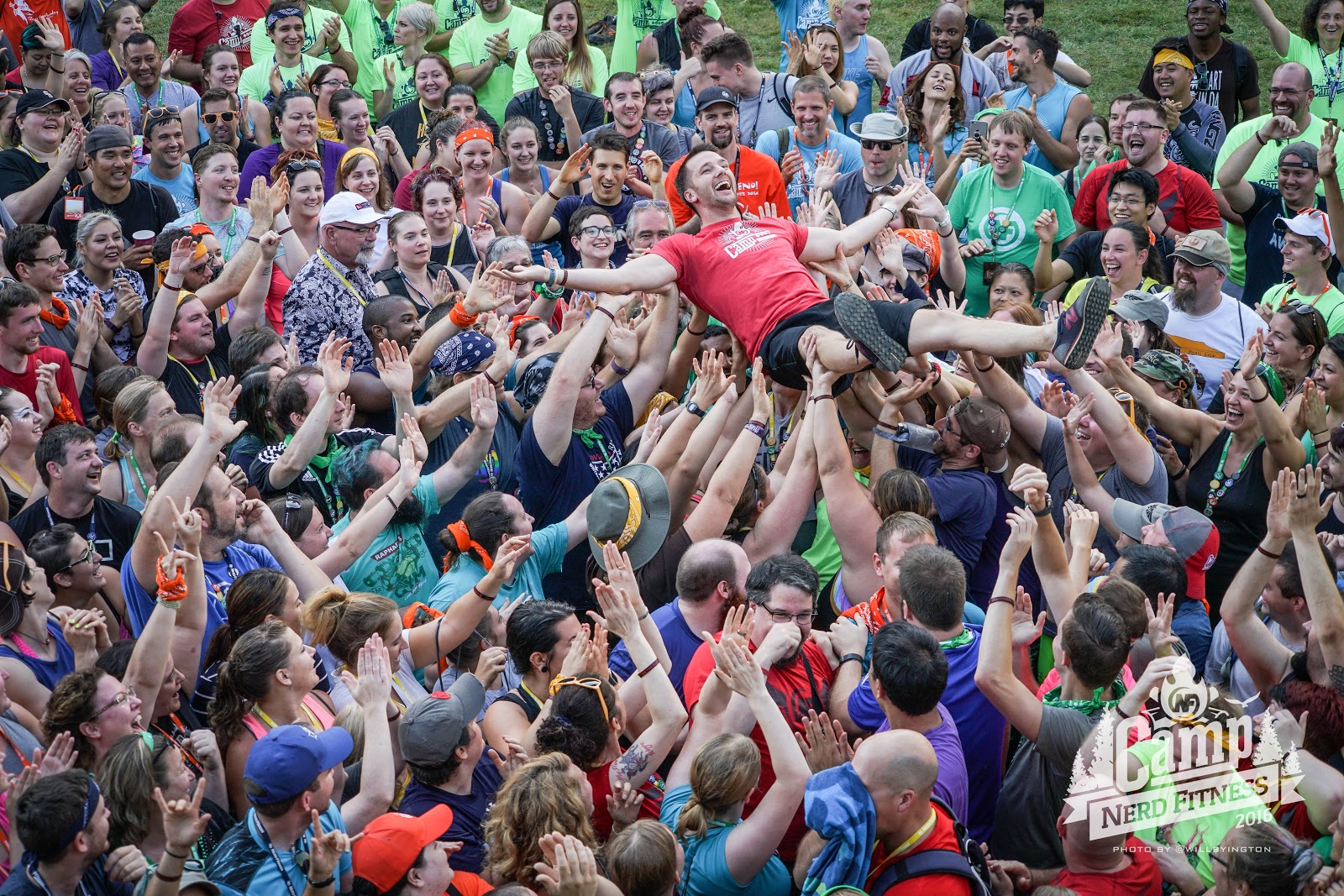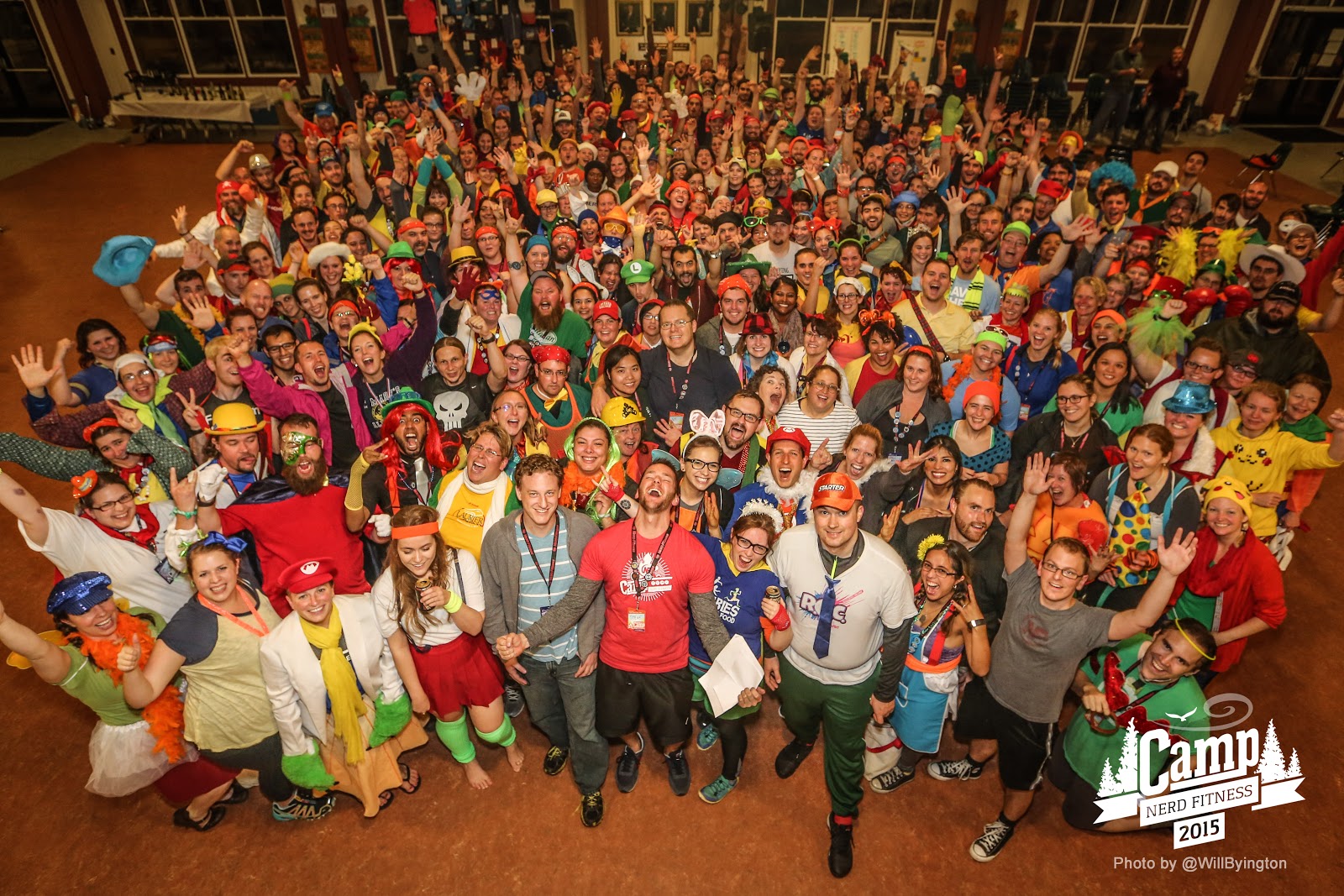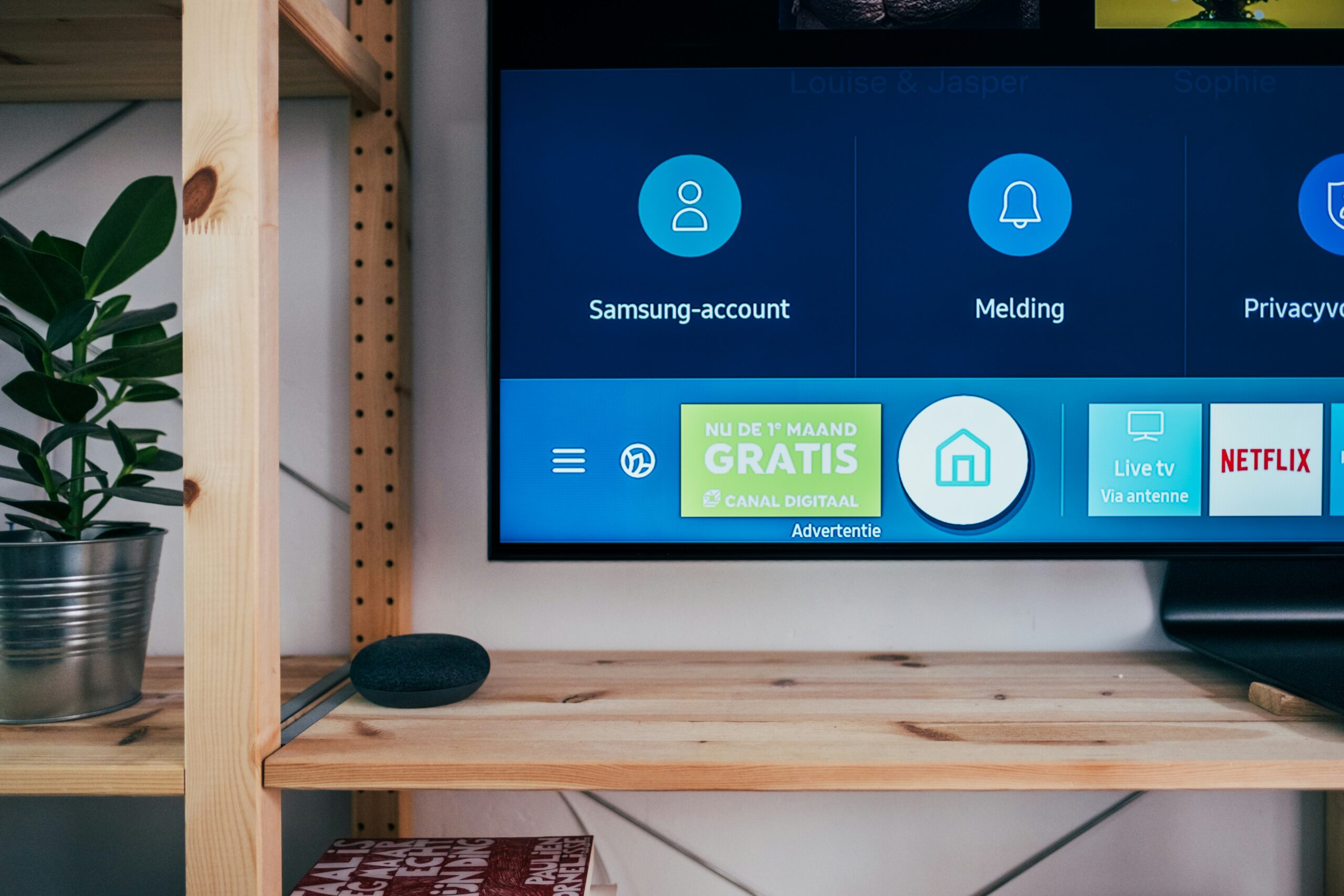
The turnaround: How Nerd Fitness overcame its plateau
In marriage, they call it the “seven-year itch”: the moment when two people have been married for so long the familiarity becomes a detriment, blinding them to some of the reasons they fell in love in the first place.
In business, we just call it “getting stuck.” It’s when your business plateaus and a founder sees signs of stagnation, even decline. It’s an advanced entrepreneur’s problem, which makes it all that harder to solve. And that’s where Nerd Fitness founder Steve Kamb found himself 18 months ago.
The popular blog and online community dedicated to helping self-described nerds get in shape was doing all the “right” things. Seven years into his business, Kamb had hired a team. He was working on a portfolio of projects. And yet… he was more stressed than ever and the numbers weren’t moving. And worse, he didn’t know why.
Kamb found himself avoiding the hard questions. “Imagine knowing you have to go to the dentist but you don’t want to go, because you know you have a cavity,” he said. “You don’t want to go because that would mean admitting you have a cavity. That was me.”
What happens when you can’t “growth hack” your way out of the problem? What then?
We sat down with Kamb to break down how he fought his way out of the plateau and is back to a growing business (including tripling his opt-ins), thriving community, and way fewer sleepless nights.
Interview edited for length and clarity.
How would you describe the growth of Nerd Fitness into last year?
I was very elementary and a bit ignorant when it came to Nerd Fitness’s growth. I’d write articles, occasionally launch a new product that would catch on, and growth seemed to roughly double every year. And then I spent a good year and a half with significantly slower growth despite the business having more employees and working harder. Which necessitated a dramatic rearranging of the company behind the scenes, and that was pretty much all of 2017. Now we’re back on track in an exciting way and things are picking up steam again.
So what happened?
I was building a movement and a community and people are asking for products and services … so I hired a bunch of people, but didn’t provide enough guidance. I didn’t give them win scenarios, I didn’t tell them what they can do at Nerd Fitness to make an impact. I didn’t dig into whether each person was making my life easier, generating revenue for Nerd Fitness, or protecting revenue we already have. I had a lot of people that were really hard workers but did not satisfy any of those criteria. As a result, our revenue stagnated and our expenses went up. And I didn’t really have the courage to look into the black box and address the unknowns and find answers.
And I imagine that is personally frustrating, to feel like you’re working so hard and nothing is moving.
Oh yeah! In the past, I like to think I succeeded because of my “ignorant optimism.” Eight years ago I’m glad I didn’t know any better. Anybody would have told me, “Don’t start a fitness website, it’s an oversaturated market.” I didn’t know any better so I just put my head down and wrote 800+ blog posts full of unique helpful content. That worked for a long time … up until the middle of last year. But then we got to the point where we all put our heads down and worked harder and longer hours, it wasn’t working anymore. So you could say I succeeded because of myself for a long time, and then I started succeeding in spite of myself.
That’s a bracing thought and takes a lot of self-reflection. How did that click?
It was painful. I was fortunate to serendipitously meet a guy who has become a mentor here in New York City. I was at an event and I had no idea who he was and we just started talking. He loved the idea of Nerd Fitness and recognized a lot of fundamental executive naiveté and managerial mistakes I was making. We started meeting regularly and I shared a lot of my struggles with him and he essentially gave me a crash MBA course, one hour at a time: things like cash flow, customer acquisition costs, my lifetime customer value… Honestly it was humbling and embarrassing, as I had to sheepishly say, “I don’t even know what those terms mean!”
Then he asked me how each of my employees were generating revenue or protecting it and I didn’t have an answer for that either. He made me get back to first principles and question why we did anything and how we did everything. This included all the basic business stuff like advertising, funnels, and QuickBooks, but also deep dives into team building (“Is this employee focused on the right thing? Are they the right person for the job? Do we even need this position?”).
I came back each week with the completed homework he assigned me, exhausted but excited. I was a rookie boxer getting into the ring with a coach that was beating the crap out of me. I was learning so much, but it was really painful. It was brutal. After digging into our finances and expanding expenses, I realized I had ignored the problems long enough and mismanaged enough things that I had to grow up and make some tough decisions: I had to let people go and reposition other people to different parts of the company.
Almost instantly, a lot of the pressure had dissipated, and we were no longer sinking. It was very clear in hindsight that I had made the right decision, and that I had definitely waited too long to address many of the issues. Fortunately, once we stopped fighting for our lives, then we started to get excited about the trajectory of the company and the community again. People started to work on things that helped the business, that helped the community.
From a personal perspective, it seems like you changed from being a founder to a CEO.
I always felt like a scrappy internet blogger guy. But I realized I wasn’t that anymore. I had a payroll. Employees with healthcare challenges. It’s a business that people with families depend on, with a community of people to help. I had to change how I thought about everything.
A big part of that was switching from being a starving artist to someone who runs a company. I kinda shied away from make tough decisions for a while, but if I wanted to be a scrappy internet blogger I wouldn’t have hired all those people and spent years building us into a legitimate company.
You talk about Nerd Fitness as a movement. It’s really moving to see the transformations some of the people have on your site.
Oh, I seriously cry once a week from reading an email from somebody whose life was changed by Nerd Fitness. There was one guy who shared his story, who was a coaching client. He was telling us that three years ago he surprised his wife with a trip to Harry Potter World. They got to the front of the line and he sat into the roller coaster and they couldn’t put the support on and he had to get off the ride. He was crushed. So they walked him back past everyone.
He joined Nerd Fitness and two years later he went back and rode that roller coaster six times. He sent us a picture sitting in the seat with his thumb up. Can you get more “Nerd Fitness” than “Guy can’t ride Harry Potter roller coaster and then comes back and redeems himself”? I couldn’t be more proud!
Let’s go to what you actually changed. What did you decide to focus on?
We cut a lot of projects. Specifically we put our events plans on hold. We also learned how important the first 30 days of the reader experience was. The majority of people find us after a life event and don’t know what they are doing and need help. Those are the people I was neglecting almost accidentally. Those are the people that pay most of our bills.
I had been writing Nerd Fitness for eight years. Whenever I would write I would think of the people that were with me for those eight years. Instead of, “What about the person that just found us for the first time, like tens of thousands of people every day?” I completely ignored their experience, even though we came to learn that a majority of our sales came from new people who had just discovered Nerd Fitness for the first time. These were the people paying most of our salaries, so we focused on making that experience better.
So instead of publishing two new articles a week, which is what I used to do, I scaled back on new content and focused on improving a new reader’s first day experience on Nerd Fitness, and then what happens to them over their first 30 days in our community. It was huge. On the email sign-up front, with two weeks of focus on a reader’s first day experience, we went from 12,000 email opt-ins a month to 35,000 to 40,000 opt-ins per month.
Learn to take control of your finances and spend your money GUILT-FREE with our free Ultimate Guide To Personal Finance below:
What specifically did you change?
We created very specific bonuses for our most popular articles. We went back and rewrote content that most people were finding us from to make it as valuable as possible. And then once they found it, we automated their email experience based on what they read. I was doing none of that before. In about six weeks, the business transformed.
Now obviously I still understand the importance of creating new content and I am getting back to doing more of that. But it was tough to make myself focus on fixing the old stuff rather than chasing new stuff. I got emails all the time from people asking why I had stopped writing new content and if anything was wrong. And I would say, “We’re better than ever! It’s just that you’ve been reading for eight years, we had to fix some stuff. New content is still coming.”
Now, anybody that finds Nerd Fitness is much more likely to have a great experience from day one, get the help they need from the resources that fit their situation, and be more likely to invest in one of our products or services. Before that, it was not optimized in any way.
Did you rewrite the onboarding funnel?
Multiple times in multiple ways. We split tested and segmented each reader that signed up based on the article they read, by their goals, by their gender, and so on. We tried to identify the avenue that works best and we’re still working on it. We also tried things that didn’t work or move the needle.
For example, I spent a good two weeks writing an onboarding funnel that I thought was fantastic, but the data showed it produced negligible results. So we scrapped it and moved on. But we learned something. In the past, I would have just assumed my hard work would translate to better results, without actually digging into the data to prove or disprove it. Now, I’m less concerned about how it feels or looks and instead focused on what is helping the most people.
What else did you change?
The other change was actually one we made accidentally but has since become a big part of our company: I had a few team members that were misaligned with what they focused on and didn’t pass the “is this adding value to our company or our community in a measurable way?” test. Which was completely my fault, as I hadn’t put them in the right place to begin with.
So we made a big change. Because they are trained fitness professionals, I asked them to pivot dramatically and become coaches to help readers in a 1-on-1 capacity. So they became our first ever Nerd Fitness coaches. Then we realized a lot of people were looking for this. Now we have this massive branch of our company that didn’t exist six months ago. We tried it and it’s working. Now we’re scaling up, we just hired another full-time coach and will need to expand more in the near future.
How’d you figure out coaching was the next step?
We had two team members that were working on projects that didn’t generate or protect any revenue, and both team members are trained fitness professionals. So we presented them with the opportunity to keep working at Nerd Fitness but in a very different position, and they accepted and pivoted very quickly.
We then sent one email to our previous female customers and male customers offering a coach of their respective gender. In two days we had 100-plus applications for each saying, “We’re ready to pay!” That was a really encouraging sign. Some people can follow the course no problem. Some people need a group. Other people need a person telling them exactly what to do. Now we can serve each of those parts of our audience that we couldn’t before. And we’ve dug into the profit margins and ratios and lifetime value for coaching and we see it as the biggest place for us to grow in 2018. It’s really cool.
Is there anything else you changed?
I stopped being afraid and started truly understanding the business.
We transitioned to QuickBooks to see money in and money out. We built a cash flow document to see which products generated the most revenue based on the time spent on them. We calculated what percentage of time each employee was spending on each product and where it SHOULD be focused.
It was digging into the business stuff. I now have a really detailed projection of how I believe the company will do in the next 12 months. There are no surprises. In the past I would pay for something on a yearly basis, or we’d collect money for a big event 10 months in advance, forget about it, and then come time for the event, our costs would spike.
I actually know that stuff now, because we put systems in place and are smart about our emergency fund and costs.
Now that things are better than they’ve ever been, I need to put on horse blinders because I am always looking for the next thing. When things go well you start to see opportunity everywhere. Then I have to tell myself “No! Stay in your lane! Do a few things and do them well! Only after that can you expand!” Kamb and the Nerd Fitness community
Kamb and the Nerd Fitness community
What advice do you have for someone else struggling with a plateauing business?
You have to know where your money is coming from and where it’s going. Know your numbers. Everyone wants to do the whole “start a business around your passion and it will work as you work hard!” No. You need to provide a service that solves someone’s problem. And you need to do it better or differently than other people. You’re competing with everyone on the internet for somebody’s time, attention, and hard-earned money.
Nerd Fitness worked for a long time because of my tenacity, yes, but then it worked in spite of it. It took a while to realize we needed to go back to basics: just a few things and do them right.
I would also recommend that you step up and be brutally honest with yourself, the company you’ve built, and the people that you are working with. We didn’t only have employees we had to think about, we had contractors we were paying a lot of money to do things like SEO, split testing, and Facebook ads.
I thought I was supposed to do Facebook ads, and just throw money at a company to manage them for me. What a terrible idea. It wasn’t until we dug into the numbers that we found that nearly all of the contractors and companies we worked with weren’t pulling their weight. In short, it cost us more money to work with them than if we hadn’t. We parted ways with a lot of contractors. Immediately my life got simpler and we had more money in the bank. I wish I had done that sooner.
The reality is that we had outsourced these critical pieces of our company to people that weren’t up at night worrying about the business. That’s our job and that means we need to know these parts of our company inside and out rather than passing them off. So we learned each system and can operate them like technicians — which means we can pass things off amongst our team internally, save money, and get better results.
Why don’t other people talk about the nuts and bolts like this? Is it because “put your stuff in QuickBooks” isn’t a good blog headline, so we don’t write about it?
It’s not fun, but oh man is it important. People will say, “I don’t know how that stuff works.” Or, “I want to find somebody to run this for me so I can be the ideas man.” Man, you built a business, which means you can learn how to do this too. And you NEED to.
Start simple. We started our cash flow with money in and money out each month. Simple. Then we split out the “money in” by product, and the “money out” by recurring costs like salaries, contractors, expenses. If we had started with a more complex system, I bet I would have overwhelmed myself and not been able to do it. After avoiding it for a long time, I finally realized, “You gotta put your big boy pants on and deal with it.”
I’m sure many people go too far the other way and come out of the gate tracking and split testing everything before asking the fundamental question, “Am I helping people?” They do steps B through Z. They miss A. I did the opposite. I was focused on A and never went further. I had to learn my ABCs.
Written by Ramit Sethi
Host of Netflix's "How to Get Rich", NYT Bestselling Author & host of the hit I Will Teach You To Be Rich Podcast. For over 20 years, Ramit has been sharing proven strategies to help people like you take control of their money and live a Rich Life.



